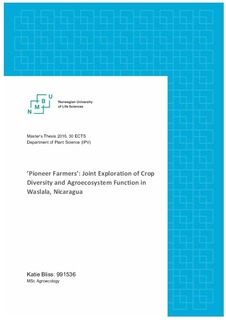'Pioneer Farmers' : joint exploration of crop diversity and agroecosystem function in Walsala, Nicaragua
Master thesis
Permanent lenke
http://hdl.handle.net/11250/2404571Utgivelsesdato
2016-09-06Metadata
Vis full innførselSamlinger
- Master's theses (IPV) [240]
Sammendrag
Exploring the role of crop diversity on the functioning of agroecosystems has significant implications for agriculture. ‘Pioneer farmers’, on Nicaragua’s agricultural frontier are adapting their cropping systems to new agroecological conditions including steep slopes, heavy rainfall and market inaccessibility which characterise the region. Farmers report that integration of a greater diversity of crops has regenerated previously degraded land and improved performance of their agroecosystems. Working in partnership with Bioversity International and local NGOs in Waslala, the role of crop diversity on agroecosystem function was explored together with farmers in their fields, using a participatory joint learning approach. Results show that farmers in Waslala are managing highly diverse systems which enable year-around dietary diversity, food security and income stability. Farmers are using agroecological diversification practices which contribute to key agroecosystem functions such as pest and disease suppression, microclimate regulation and reducing soil erosion. Supporting theories from ecology, farmer’s experiences in Waslala suggest a link between agroecosystem diversity, productivity, stability and resilience. Opportunities to further enhance the use of crop diversity to overcome current and future challenges were also explored with farmers and local stakeholder and potential interventions identified. However, it is important to note that these interactions can be difficult to manage at a farm scale and negative interactions must be traded off with benefits. Diversification is not a solution to all problems for all farmers and some are seeking other strategies. Through joint exploration this study has shed new light on the link between crop diversity and agroecosystem function and led to the co-production of new knowledge. Reflection on this process highlights important considerations for future development of more engaged research processes. As farmers in other parts of the world are facing increasing challenges, experiences in Waslala suggest that agroecological diversification could be a viable option to increase productivity, stability and resilience in the face of change.
